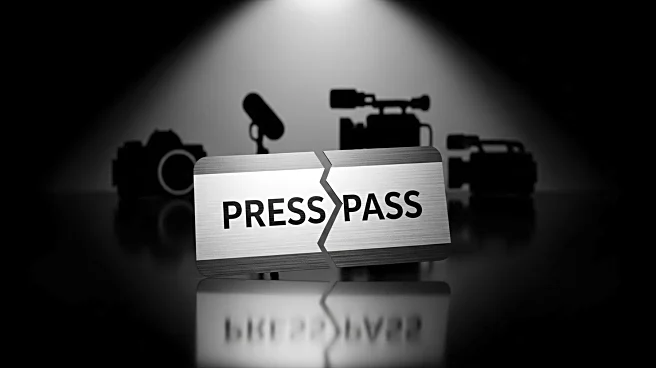What is the story about?
What's Happening?
The Pentagon has announced new restrictions on journalist access, requiring reporters to obtain government authorization before gathering or reporting information, even if it is unclassified. This decision, communicated through a memo, mandates that journalists sign a statement agreeing to these rules or face revocation of their press credentials. The move has been met with condemnation from multiple press associations, including the National Press Club, which labeled it a direct assault on independent journalism. Democratic lawmakers, such as Sen. Jack Reed, have also criticized the restrictions, viewing them as an affront to free speech and freedom of the press. Defense Secretary Pete Hegseth defended the measures, emphasizing that the press does not run the Pentagon. The memo outlines that only authorized individuals with signed non-disclosure agreements and a need-to-know basis may access classified national security information.
Why It's Important?
The new restrictions on journalist access at the Pentagon have significant implications for transparency and accountability in reporting on U.S. military operations and spending. Critics argue that these measures could lead to government censorship, limiting the public's access to independent reporting and potentially obscuring the truth about military activities. The policy has raised concerns about prior restraint, a violation of press freedom under the First Amendment, and reflects a broader pattern of government hostility toward transparency. The restrictions could impact how defense dollars are scrutinized and how wars are reported, affecting public perception and trust in military operations.
What's Next?
The implementation of these restrictions may lead to further legal and political challenges as press associations and lawmakers push for their rescission. The Society of Professional Journalists has already demanded the measure be revoked, citing it as an attempt to muzzle the press. As the situation unfolds, there may be increased advocacy for press freedom and transparency, potentially influencing future policy decisions. The Pentagon's approach to managing journalist access could face scrutiny and pressure from civil society groups advocating for democratic norms and accountability.
Beyond the Headlines
The restrictions on journalist access at the Pentagon highlight deeper issues regarding the balance between national security and press freedom. The policy raises ethical questions about the role of independent journalism in holding government institutions accountable. It also underscores the cultural shift towards increased control over information dissemination, which could have long-term implications for democratic engagement and public trust in government transparency.
















